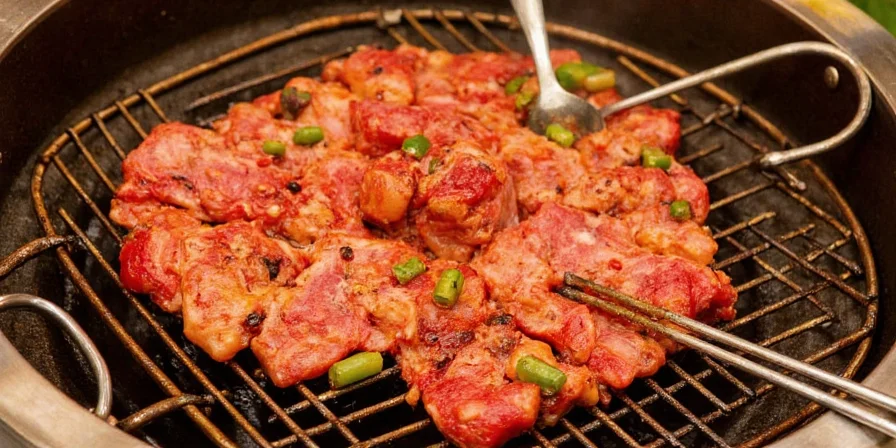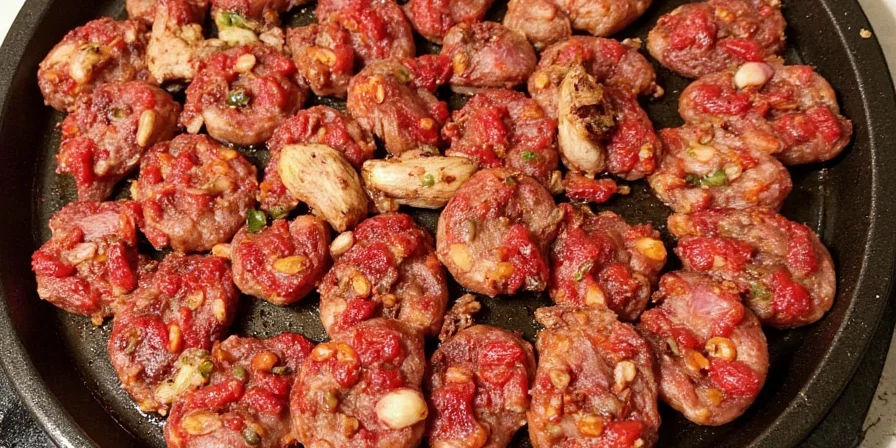Korean BBQ: A Spicy, Sizzling Celebration of Flavor and Fire!
Fire up the grill, grab your chopsticks, and prepare your taste buds for a flavor-packed fiesta straight from the heart of Seoul! Korean BBQ isn't just a meal—it's a full-on sensory experience that brings people together with sizzling meats, bold spices, and a side of serious fun. Whether you're a seasoned spice hunter or a curious foodie, this guide will take you on a delicious journey through the smoky, garlicky, umami-laden world of Korean BBQ.
What Exactly Is Korean BBQ?
Korean BBQ, known locally as Gogigui (고기구이), translates literally to "meat grill." But don’t let that simple translation fool you—this is no ordinary backyard cookout. Gogigui involves grilling thin slices of marinated or unmarinated meat at the table over gas or charcoal flames. It’s interactive, communal, and oh-so-delicious.
- Interactive: You cook it yourself!
- Communal: Meant to be shared among friends or family.
- Delicious: The magic is in the marinades and side dishes.
The Meat of the Matter: Types of Meat in Korean BBQ
In Korean BBQ, variety is the spice of life. Here’s a quick rundown of the most popular cuts and meats you might encounter:
| Type of Meat | Description | Common Marinade/Seasoning |
|---|---|---|
| Buldak (불닭) | Spicy grilled chicken | Red chili paste, garlic, sugar, sesame oil |
| Samgyeopsal (삼겹살) | Thick-cut pork belly | Salt, pepper, or soy sauce-based marinade |
| Galbi (갈비) | Beef short ribs | Sweet soy sauce, garlic, pear juice, sesame seeds |
| Chadolbaegi (차돌박이) | Thin-sliced beef brisket | Light seasoning or none at all |

Marination Station: What Makes Korean BBQ So Flavorsome?
Korean BBQ shines because of its balance between sweet, salty, spicy, and savory notes. Let’s break down some of the key ingredients that bring those flavors to life:
- Doenjang & Gochujang: Fermented soybean paste and red chili paste add deep umami and heat.
- Garlic: Used generously in both marinades and raw garnishes.
- Pear or Apple Juice: Often used to tenderize meat while adding natural sweetness.
- Sesame Oil: Drizzled over grilled meat for a nutty finish.
- Kimchi: Adds acidity and spice, perfect for cutting through rich meats.
Pro Tip: Make Your Own DIY Korean BBQ Marinade
Ready to impress your guests with homemade flavor? Here’s a basic bulgogi marinade recipe that’ll make your taste buds sing:
- 1/4 cup soy sauce
- 2 tablespoons brown sugar or honey
- 2 cloves minced garlic
- 1 tablespoon sesame oil
- 1 tablespoon rice wine vinegar or mirin
- 1 teaspoon ground black pepper
- Juice of half a pear (optional but highly recommended)

Grill Like a Pro: How to Host a Korean BBQ Night
If you’re ready to host your own Korean BBQ bash, here are the essential tools and tips to turn your dinner into a full-on flavor fest:
- Grill Type: Choose between electric indoor grills or traditional charcoal setups outdoors.
- Cutting Board & Scissors: Korean BBQ often includes slicing meat right at the table.
- Side Dishes: Never underestimate the power of banchan (반찬), the array of small side dishes served alongside the main course.
- Leaf Wraps: Perilla or lettuce leaves for wrapping meat like a pro.
- Dipping Sauces: From sesame salt to spicy gochujang mixes, these elevate every bite.
Pro Tip: Set Up Your Banchan Bar
Banchan is the unsung hero of any Korean BBQ feast. Here’s what to serve:
| Side Dish | Taste Profile | Why It Works |
|---|---|---|
| Kimchi | Spicy, sour, fermented | Cleanses the palate after rich meats |
| Kongnamul Muchim | Refreshing, nutty, light | Balance to heavier flavors |
| Pa Kimchi | Spicy, garlicky, crispy | Adds crunch and kick |
| Oisobagi | Crunchy, tangy, cooling | Great contrast to grilled goodness |

Wrap It Up: The Art of the Meat Wrap
A defining feature of Korean BBQ is how you eat it—with your hands, wrapped in fresh greens! Here’s how to wrap like a local:
- Take a leaf of perilla or lettuce.
- Add a slice of grilled meat.
- Top with kimchi, garlic slivers, and a dab of ssamjang (a spicy paste made from doenjang and gochujang).
- Wrap it up like a burrito and enjoy!
Pro Tip: Try These Unique Wraps
- The Classic: Bulgo-gi + lettuce + ssamjang
- The Crunchy: Samgyeopsal + raw garlic + kimchi
- The Fresh: Grilled shrimp + mint leaves + cucumber slices

From Seoul to Your Table: Global Variations Inspired by Korean BBQ
Korean BBQ has inspired countless global fusion styles, blending its bold flavors with local ingredients. Here are a few cool spins on the original concept:
- Taco-Bulgogi: Korean tacos using marinated beef in corn tortillas.
- Korean Wings: Fried chicken coated in spicy gochujang glaze.
- Kimchi Quesadillas: Melted cheese stuffed with spicy kimchi and grilled meat.
- Buldak Mac n’ Cheese: Spicy chicken meets creamy pasta in one fiery dish.

Conclusion: Why Korean BBQ Is More Than Just a Meal
Korean BBQ is more than meat on fire—it’s a cultural ritual centered around sharing, savoring, and celebrating good company. With its explosion of spices, textures, and techniques, Korean BBQ offers something for every palate, whether you're craving something sweet, spicy, smoky, or savory. So next time you see a tabletop grill firing up, don’t just dig in—embrace the experience, wrap it up, and savor every bite.
Whether you're hosting friends or experimenting in your kitchen, remember: the key to great Korean BBQ lies in the details—from the marinade to the wraps to the side dishes. So go ahead, get messy, have fun, and let the sizzle do the talking!











 浙公网安备
33010002000092号
浙公网安备
33010002000092号 浙B2-20120091-4
浙B2-20120091-4